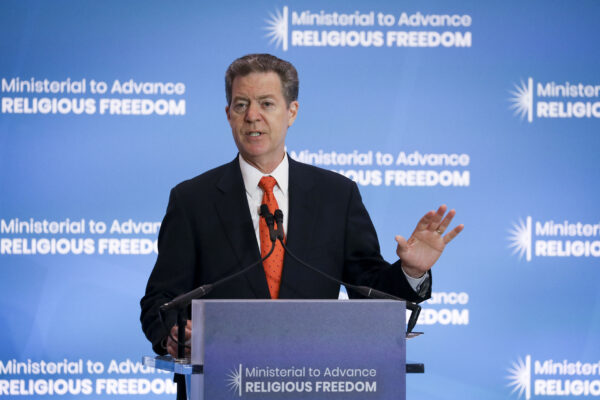WASHINGTON—The official press office for the spiritual practice Falun Gong is sounding a warning: Beijing attempts to influence U.S. public opinion by using a distorted and biased narrative that portrays an ideal view of the Chinese Communist Party when it comes to religious freedom.
The Party employs this strategy using major search engines, including Google, Bing, Yahoo, Ask, and Duckduckgo, researchers say.
When asked about Googles role in spreading Communist Party propaganda that distorts the Partys record on religious freedom and attacks Falun Gong, U.S. Ambassador-at-Large for International Religious Freedom Sam Brownback put the issue in a larger context. He said Chinas growing influence has become a major concern in the United States and may demand a response from Congress or the administration.
“Theres a robust debate in the country right now, whether its the tech companies or sports entities. This is a big, robust debate. These issues should be brought up and they should be discussed,” he said at a press briefing on Oct. 25, ahead of International Religious Freedom Day.
Oct. 27 marked the 21st anniversary of the International Religious Freedom Act of 1998, which was passed to endorse religious freedom as a foreign policy of the United States.
“We stand for freedom of speech. We stand for freedom of religion,” Brownback said, noting that the government should protect those basic human rights. But these principles also apply to individuals and companies in the United States, he said.
Brownback said the “robust discussions” are important for “reaffirmation of these basic principles” and may sometimes prompt Congress or the administration to take action.

Religious Freedom in China
The Chinese regime tries to exploit Google, the worlds leading search engine, to influence the American public, according to Falun Dafa Information Center (FDIC) researchers.
For example, when a user searches for “religious freedom in China,” Google guides the user by presenting the “People also ask” box. In this box, Google typically lists the most common questions matched up with what the search engine deems to be the most credible answer.
One of the questions presented by Google is “Does China have freedom of speech and religion?”
And the response to the question is: “The 1982 Constitution provides its citizens the right to believe in any religion, as well as the right to refrain from doing so: Citizens of the Peoples Republic of China enjoy freedom of religious belief.”
A similar issue arises when searching for “Falun Gong,” an ancient spiritual discipline brutally suppressed in China. Google lists the question “Is Falun Gong Buddhist?” and the top answer takes the user to a Chinese regime website that attacks the meditation practice, according to FDIC spokesperson Erping Zhang.
“This is akin to directing users to a neo-Nazi website to learn about the finer points of Judaism,” said Zhang. “These answer boxes are supposed to direct you to what Google considers to be the foremost authority on any given topic. Does this mean Google believes the Chinese regime to be the most authoritative on the topic of Falun Gong and religion?”
Zhang said FDIC raised that issue with Google a few weeks ago and still hasnt received a response.
Googles search results for “Falun Gong” in the UK include the same Chinese Communist Party-controlled websites as appear in searches in the United States.
For searches in the Chinese language, the results are even more slanted toward the Chinese regimes views. On some pages, Chinese Communist Party-controlled sites make up the majority of search results. This pattern is observable across several search engines, including Bing, Yahoo, Ask, and Duckduckgo, according to FDIC.







